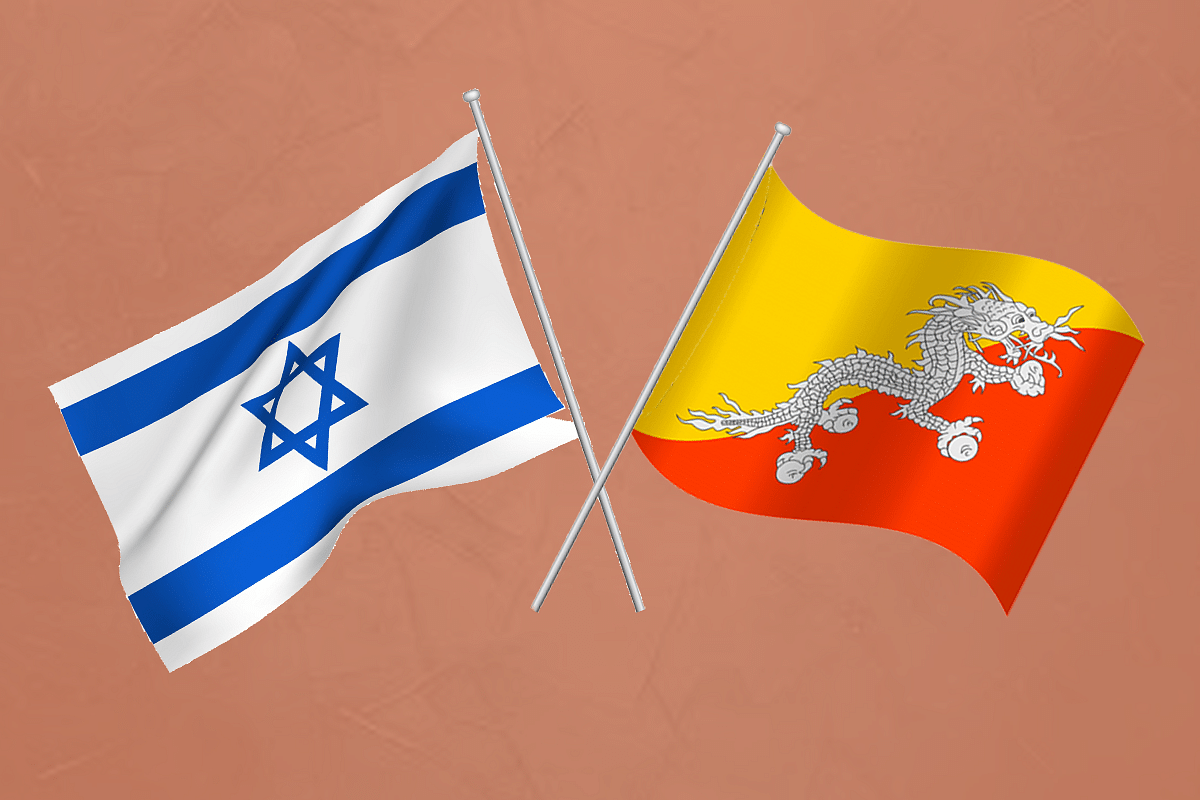World
Explained: How The Setting Up Of Diplomatic Ties By Bhutan With Israel Represents A Setback For China
- China’s footprints in Bhutan are set to diminish, thanks to some deft diplomatic manoeuvring by New Delhi.

Bhutan and Israel flags.
The establishment of formal diplomatic relations between Bhutan and Israel last week represents a considerable setback for China and a quiet victory in the eastern Himalayas for India.
An agreement to establish the ties was signed between Israel's Ambassador to India Ron Malka (see his tweet) and Bhutan's envoy to India, Major General Vetsop Namgyel, at the Israeli Embassy in New Delhi last weekend.
While both the countries termed the development as “historic” and celebrated it, there was also quiet cheer at the high offices of the Ministry of External Affairs (MEA) in New Delhi’s South Block.
That's because the formal entry of Israel in Bhutan will translate into the Himalayan kingdom turning towards Tel Aviv for its requirements in the latest technology in agriculture, communications and other areas.
“Israel is a global leader in many fields and Bhutan will benefit immensely from this new partnership with Israel,” said Bhutan's former foreign minister Damcho Dorji.
China, keen on increasing its footprints in the ‘Land Of The Thunder Dragon’ (Bhutan), had been offering Thimpu help in farm technology and other areas. China had also been quietly increasing its involvement in Bhutan's economy by emerging as a major supplier of many goods, including garments, electronics and consumer durables to the landlocked country.
The deal to establish full diplomatic ties with Israel was preceded by another equally significant one between Bhutan and Germany. German envoy to India, Walter J Linder, inked the agreement with his Bhutanese counterpart to India and the Bhutanese mission in New Delhi on 25 November.
That, too, was a setback for Beijing since Bhutan will now be able to source a lot of its requirements in the fields of technology and heavy machinery from Germany, a global leader in that and many other fields.
“Establishment of full diplomatic ties by Bhutan with Germany and Israel means those countries will not set up full-fledged embassies in Thimpu. Hence the two countries can deal with each other directly instead of going through the circuitous route of dealing with each other through their embassies in New Delhi as has been the practice till now,” a senior MEA officer told Swarajya.
Bhutan has full diplomatic ties with some 50 countries and joined the United Nations in 1971. A 1949 treaty between India and Bhutan allowed New Delhi to “guide” Thimpu in the conduct of its foreign affairs.
However, the 1949 treaty was replaced by a fresh treaty signed between then foreign minister Pranab Mukherjee and Bhutan's crown prince Jigme Khesar Namgyel Wangchuk in 2007 (read this).
Though the 2007 agreement allowed Bhutan leeway in its conduct of foreign relations, New Delhi continued to play a major role in the Himlayan kingdom's ties with other countries.
South Block has been quietly encouraging Bhutan to establish diplomatic ties with western countries and countries like Israel with which India has deep ties. The objective is to limit China's pernicious influence in the eastern Himalayas while, at the same time, accelerate Bhutan's development.
India has also been encouraging Bhutan to deepen its cultural and people-to-people ties with Europe and countries like Israel and facilitate tourist inflows from these countries.
This, again, is to wean Bhutan away from China. Beijing had started investing heavily in cultural exchanges with Bhutan and in enhancing educational and social ties with the Himalayan kingdom.
China had rolled out hundreds of scholarships for Bhutanese youth in its universities and had been encouraging its tourists to visit Bhutan.
China had also stepped up its engagements with Bhutan's civil society and academia and had been flying out many top intellectuals, bureaucrats, academics and professionals to China on exchange visits.
But, as the senior MEA officer in Delhi pointed out, such visits are used to ‘indoctrinate’ the Bhutanese and create an influential community and ecosystem in Bhutan that will be favourably inclined towards China.
According to inputs received by the MEA in New Delhi, China has been leveraging such exchanges with Bhutan to create ill-will against India.
“The Chinese propaganda machinery bombards visiting Bhutanese students, academics, professionals, bureaucrats and politicians with anti-Indian messages and tries to turn them against India. The propaganda blitz includes telling the visiting Bhutanese that their country can benefit enormously if they junk India and forge close ties with Beijing,” said the MEA official.
The adverse effects of such Chinese propaganda among the Bhutanese, especially the country’s younger generation, led India to formulate the counter strategy of encouraging Bhutan to establish full diplomatic ties with other countries that are not favourably inclined to China and with which India has close ties.
The presence of countries like Germany and Israel in Bhutan will automatically lead to China's influence over Bhutan diminishing considerably. These countries can offer much more to Bhutan in terms of technology, education and human resources than China, explained the MEA official.
Bhutan, it is learnt, will also establish full diplomatic relations with some other Asian nations which are outside China's sphere of influence. But that will happen in a calibrated manner.
China's footprints in Bhutan are, thus, set to diminish. Thanks to some deft diplomatic manoeuvring by New Delhi.
Introducing ElectionsHQ + 50 Ground Reports Project
The 2024 elections might seem easy to guess, but there are some important questions that shouldn't be missed.
Do freebies still sway voters? Do people prioritise infrastructure when voting? How will Punjab vote?
The answers to these questions provide great insights into where we, as a country, are headed in the years to come.
Swarajya is starting a project with an aim to do 50 solid ground stories and a smart commentary service on WhatsApp, a one-of-a-kind. We'd love your support during this election season.
Click below to contribute.
Latest